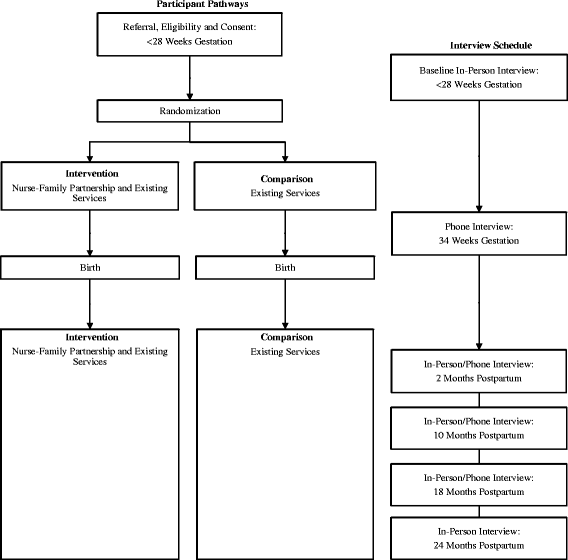Improving children's health and development in British Columbia through nurse home visiting: a randomized controlled trial protocol
- PMID: 27488474
- PMCID: PMC4972973
- DOI: 10.1186/s12913-016-1594-0
Improving children's health and development in British Columbia through nurse home visiting: a randomized controlled trial protocol
Abstract
Background: Nurse-Family Partnership is a nurse home visitation program that aims to improve the lives of young mothers and their children. The program focuses on women who are parenting for the first time and experiencing socioeconomic disadvantage. Nurse visits start as early in pregnancy as possible and continue until the child reaches age two years. The program has proven effective in the United States - improving children's mental health and development and maternal wellbeing, and showing long-term cost-effectiveness. But it is not known whether the same benefits will be obtained in Canada, where public services differ. The British Columbia Healthy Connections Project therefore involves a randomized controlled trial evaluating Nurse-Family Partnership's effectiveness compared with existing (usual) services in improving children's mental health and early development and mother's life circumstances. The trial's main aims are to: reduce childhood injuries by age two years (primary outcome indicator); reduce prenatal nicotine and alcohol use; improve child cognitive and language development and behaviour at age two years; and reduce subsequent pregnancies by 24 months postpartum. Potential explanatory factors such as maternal mental health (including self-efficacy) are also being assessed, as is the program's impact on exposure to intimate-partner violence. To inform future economic evaluation, data are also being collected on health and social service access and use.
Methods/design: Eligible and consenting participants (N = 1040) are being recruited prior to 28 weeks gestation then individually randomized to receive existing services (comparison group) or Nurse-Family Partnership plus existing services (intervention group). Nurse-Family Partnership is being delivered following fidelity guidelines. Data are being collected during in person and telephone interviews at: baseline; 34-36 weeks gestation; and two, 10, 18 and 24 months postpartum. Additional data will be obtained via linkages from provincial datasets. Recruitment commenced in October 2013 and will continue for approximately three years.
Discussion: This trial will provide important information about the generalizability of Nurse-Family Partnership to the Canadian context. Findings will be published in peer-reviewed journals and shared with policymakers and practitioners through extensive public health collaborations already underway.
Trial registration: Registered July 18, 2013 with ClinicalTrials.gov Identifier: NCT01672060 .
Keywords: Child injuries; Early child development; Nurse-family partnership; Prevention; Randomized controlled trial.
Figures
References
-
- Olds DL, Hill PL, O'Brien R, Racine D, Moritz P. Taking preventive intervention to scale: the Nurse-Family Partnership. Cogn Behav Pract. 2003;10:278–290. doi: 10.1016/S1077-7229(03)80046-9. - DOI
Publication types
MeSH terms
Associated data
LinkOut - more resources
Full Text Sources
Other Literature Sources
Medical


